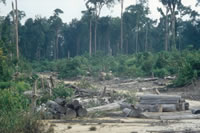Jambi, INDONESIA: A massive logging operation planned by Asian Pulp & Paper and the Sinar Mas Group (APP/SMG) and associated companies is to include large portions of the only areas that Sumatran orangutans have ever successfully been re-introduced into the wild, conservation groups active in Jambi province have learned.
Also threatened in natural forest areas around the Bukit Tigapuluh National Park are a quarter of the last critically endangered Sumatran tigers left in the wild, the Talang Mamak and Orang Rimba indigenous peoples and a significant population of endangered Sumatran elephants.
Conservation groups WARSI, the Sumatran Tiger Conservation and Protection Foundation, the Frankfurt Zoological Society, the Zoological Society of London and WWF-Indonesia learned last week that an APP/SMG joint venture had acquired the largest of the former and inactive ex PT IPA selective logging concessions in the Bukit Tigapuluh forest area – covering the orangutan reintroduction area and areas recording the most frequent sightings of tigers.
The groups have been highly critical of an APP/SMG environmental impact assessment for the neighbouring and also critically important PT Dalek Hutani Esa concession, saying it takes no account of key wildlife and indigenous peoples’ needs and should be rejected.
APP/SMG pushed a legally questionable logging road through both areas last year, opening up access for rampant illegal logging and clearing linked with increased fatalities as tigers are driven into closer contact with humans.
With the latest acquisition, APP/SMG now holds the majority of the buffer areas to the national park , including large areas the Forestry Service of Jambi and the National Park management authority agreed in 2008 to designate as the Bukit Tigapuluh Ecosystem which would be sustainably managed as natural forest.
Less than one third of the 2007 forest cover is within the National Park, with the areas most preferred by animals and indigenous peoples lying in the surrounding lowland forests now vulnerable to clearing.
“It took scientists decades to discover how to successfully reintroduce critically endangered orangutans from captivity into the wild. It could take APP just months to destroy an important part of their new habitat,” said Peter Pratje of the Frankfurt Zoological Society.
“These lowland forests are excellent habitat for orangutans, which is why we got government permission to release them here beginning in 2002. The apes are thriving now, breeding and establishing new family groups.”
Between 1985 and 2007, Sumatra island lost 12 million hectares of natural forest, a 48 percent loss in 22 years, with the accelerating rampage provoking international concern over the loss of biodiversity, smoke hazards from forest fires and peat swamp and soil degradation from clearing that made Indonesia one of the largest sources of the emissions causing climate change.
The Indonesian Ministries of Forestry, Environment, Public Works and Interior, as well as the governors of all 10 Sumatran provinces, including Jambi, announced at the World Conservation Congress in Spain last year that they were committed to protecting areas of the island with “high conservation values.”
The Bukit Tigapuluh landscape is widely regarded as one of Indonesia’s key areas of biodiversity..
“These NGOs are ready to support the Jambi governor to implement his public commitment to protecting Sumatra’s high conservation value areas and halt APP/SMG’s plan and identify alternative financing that would provide money and still save the forests, such as credits in the emerging forest carbon market,” said Ian Kosasih of WWF Indonesia.
“Bukit Tigapuluh’s forest have great potential for earning avoided deforestation credits, due to the high co-benefits of biodiversity and an indigenous community, as well as high avoidable emissions.”














